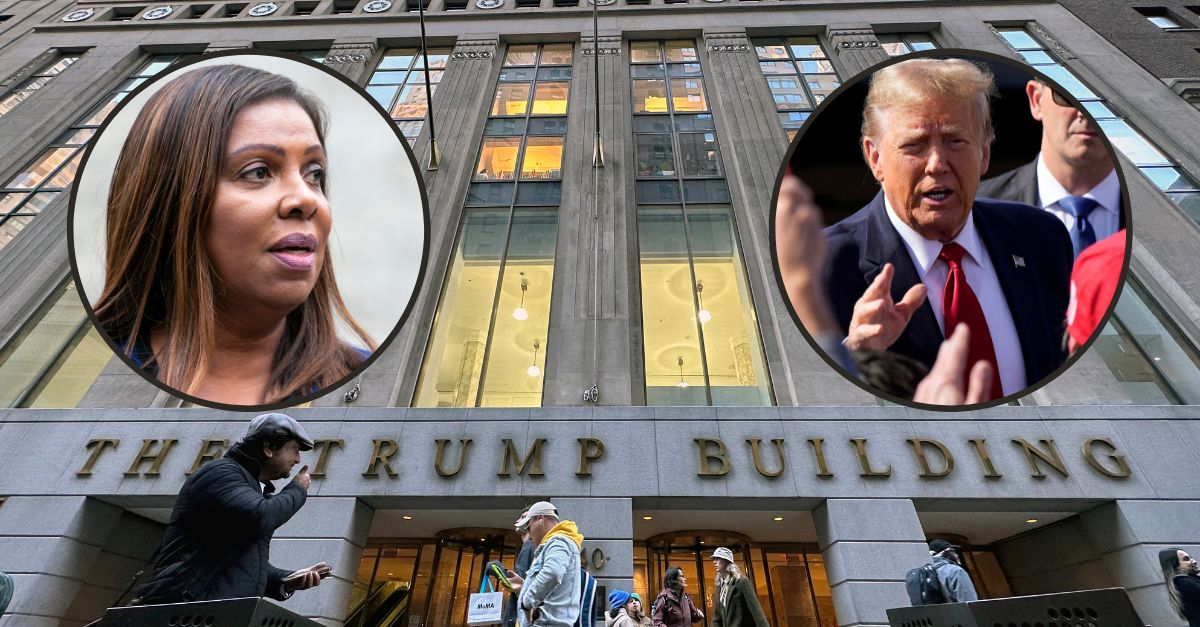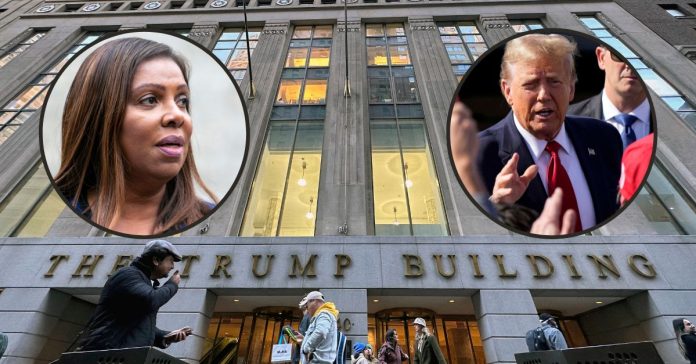
Background: People walk by The Trump Building office building at 40 Wall Street in New York City on Friday, November 3, 2023. (AP Photo/Ted Shaffrey). Inset left: New York Attorney General Letitia James (AP Photo/Ted Shaffrey). Inset right: Donald Trump. (AP Photo/Mike Stewart)
Prosecutors working under New York Attorney General Letitia James on Wednesday urged a court to reject Donald Trump‘s claims that he cannot find a private insurer to guarantee the staggering $464 million bond he must pay after he was found liable for civil fraud in the Empire State.
Trump made that argument, as Law&Crime previously reported, in a gargantuan filing on Monday to the Supreme Court of the State of New York Appellate Division, saying the amount plus interest made it a “practical impossibility” to obtain.
The very few companies who may be willing to insure the bond would only do so with cash as collateral, not real estate, he argued.
But senior assistant solicitor general Dennis Fan contends that’s not remotely the case and that despite Trump’s filing spanning nearly 5,000 pages, the “defendants supply no documentary evidence that demonstrates precisely what real property they offered to sureties, on what terms that property was offered, or precisely why the sureties were unwilling to accept the assets.”
Fan’s letter continued: “As far as the Court can infer, sureties may have refused to accept defendants’ specific holdings as collateral because using Mr. Trump’s real estate will generally need “a property appraisal’ … and his holdings are not nearly as valuable as defendants claim.”
Trump’s objections to a purported “fire sale” if they were to sell assets to generate the cash for bond or as a deposit are unwarranted, too, the state argues. The alternative would be to “shift the risk of executing on defendants’ illiquid assets to [the Office of the Attorney General].”
“If defendants were truly unable to provide an undertaking, they at a minimum should have consented to have their real-estate interests held by Supreme Court to satisfy the judgment or should have otherwise pledged security in real-estate holdings with sufficient value to secure payment of the entire judgment,” Fan, on behalf of Jones, wrote (citations omitted).
Fan said that there was also a “false premise” offered in the Monday motion by insurance brokerage executive Gary Giulietti, who testified during the civil fraud trial: Giulietti claimed Trump could not obtain a bond because he must obtain it from a single surety for the entire judgment amount.
But that, Fan argues, is patently untrue.
Appealing parties may bond large judgments by dividing the bond amount among multiple sureties, thereby limiting any individual surety’s risk to a smaller sum, such as $100 or $200 million apiece, he noted.
Trump Organization general counsel Alan Garten had doubled down on Giulietti’s assertion that Trump couldn’t post a bond or deposit because assets were tied up in real estate rather than cash or liquid securities, but in the letter to the court, Fan notes that Garten also said that at least one company, the Chubb Company — the very same that bonded Trump to pay defamed writer E. Jean Carroll — was willing to consider real estate as collateral.
Worth noting, Fan said as well, is that Garten made “unreliable representations” at trial meaning his words should be carefully scrutinized.
Using real estate as collateral is “hardly impossible as a general matter,” Fan wrote.
“And though defendants acknowledge that ‘it is possible’ to use an irrevocable letter of credit to obtain a bond, they do not explain why a bank would not accept real property to finance that letter of credit,” he wrote.
Even if the court were to take Trump or members of the Trump Organization at their word, they still failed to provide any alternative means or methods to secure judgment, the letter says.
Trump asked for leave to appeal to the Court of Appeals from any denial of their motion to stay or even a temporary stay, but that too is equally improper, according to prosecutors.
“Defendants can seek leave to appeal to the Court of Appeals only by filing a motion after the Court issues its order,” Fan wrote.
Attorneys for the former president did not immediately return a request for comment Wednesday.
Have a tip we should know? [email protected]

